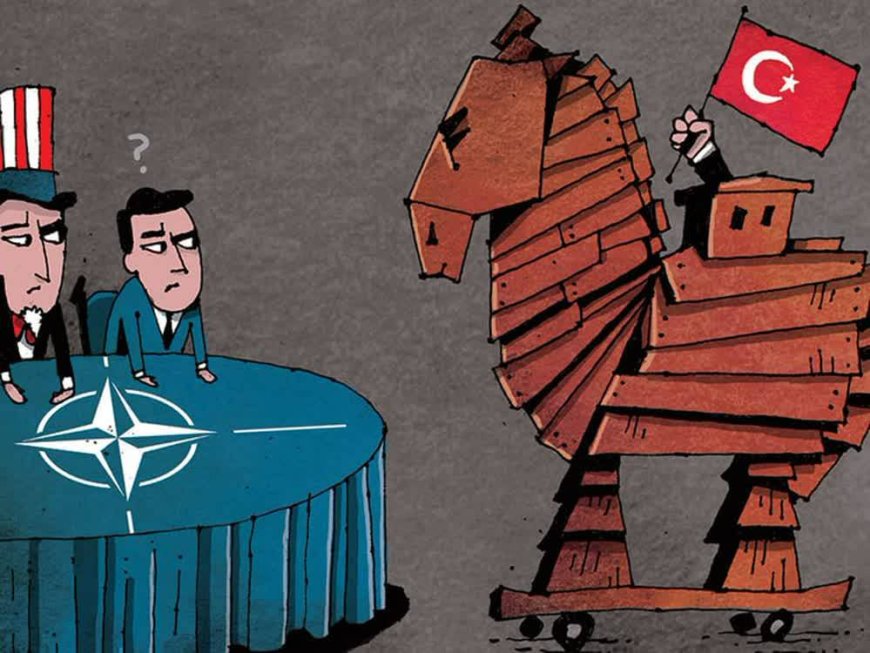Unraveling Ties: Is Turkey Seeking a Separate Path from NATO?
In the annals of international alliances, Turkey's accession to the North Atlantic Treaty Organization (NATO) in 1952 stands as a pivotal moment. Since then, the nation has emerged as a formidable force within NATO, leveraging its facilities, power, and untapped potential to bolster the military might of the US-led alliance. Widely regarded as one of the most effective members, Turkey has actively participated in all NATO activities, expanding its defense industry capabilities and shouldering a significant portion of the common budget, contributing a noteworthy 89.9 million euros last year alone.

Under the leadership of President Erdoğan, Turkey has played a prominent role in NATO military missions, forming a crucial quartet with the United States, Germany, and Italy on the eastern, northern, and western fronts, respectively, as part of the NATO support mission in Afghanistan. Additionally, Turkey's unwavering commitment to monitoring and preventing illegal passage through the Aegean Sea has cemented its position as a steadfast guardian of NATO's interests in the region. Moreover, Ankara has consistently lent its support to the missile defense development program, demonstrating its dedication to safeguarding its territory and defending its NATO allies.
The symbiotic relationship between Turkey and NATO, underscored by shared commitments and agreements, has yielded mutual benefits, fostering a robust partnership that endures to this very day. However, in recent years, Turkey has embarked on a diplomatic odyssey, deftly navigating the tides of international troubled waters and seeking to establish closer ties with both eastern and western nations.
Situated in the heart of West Asia, Turkey's strategic position has perpetually allured extra-regional powers, who seize every opportunity to enhance their relations with this pivotal nation. Notably, during the Ukraine conflict, President Erdoğan's maneuvering revealed a game of independence that left Western powers apprehensive. Turkey's pragmatic approach, consistently prioritizing interests above all else, poses challenges to the long-term objectives of Western powers.
Whispers of Turkey's potential expulsion from NATO have lingered for years, with Western countries perceiving the nation's pursuit of selective independence in foreign policy as a threat meriting catastrophic ramifications, including expulsion from the alliance. The first explicit threat of expulsion emerged following the 2016 coup attempt, when a member of the United States Congress broached the subject. Subsequently, during the debate surrounding the participation of Finland and Sweden in NATO, Turkey once again faced the specter of expulsion. Given the requirement for unanimous agreement among all members to admit new nations into the alliance, Turkey possessed the ability to impede the entry of these countries, leveraging this leverage to extract concessions from the Western front. However, it is crucial to note that Turkey, cognizant of its precarious economic situation, has never sought to inflict significant harm upon the Western front.
As the world grapples with critical decisions regarding the future trajectory of foreign policy, Turkey finds itself at a crossroads, necessitating a momentous choice. This decision transcends the immediate concerns of today or tomorrow; its ramifications will reverberate for decades to come. Turkey cannot indefinitely straddle the line between East and West, reaping the benefits of both without pledging loyalty to either. The global stage is witnessing a paradigm shift in strategic choices as America's capacity to unite nation-states around the Western Front wanes. Consequently, the geopolitical landscape will no longer consistently favor this traditional alliance. This decline in America's ability is evident in its relationship with Ankara. It is crucial to bear in mind that Turkey possesses a viable alternative: the option to forge an alliance with the BRICS nations (Brazil, Russia, India, China, and South Africa), with participation from Iran and Saudi Arabia. Such a move would establish an emerging power bloc that challenges the Western front, but it would also entail certain political and security risks for Turkey.
Ankara must tread carefully, assessing the implications of each path before making a decision that will shape its destiny. In this era of geopolitical uncertainty, the world watches with bated breath as Turkey contemplates its role on the global stage, cognizant that its choice will reshape the balance of power and chart a new course for the nation's future.













































